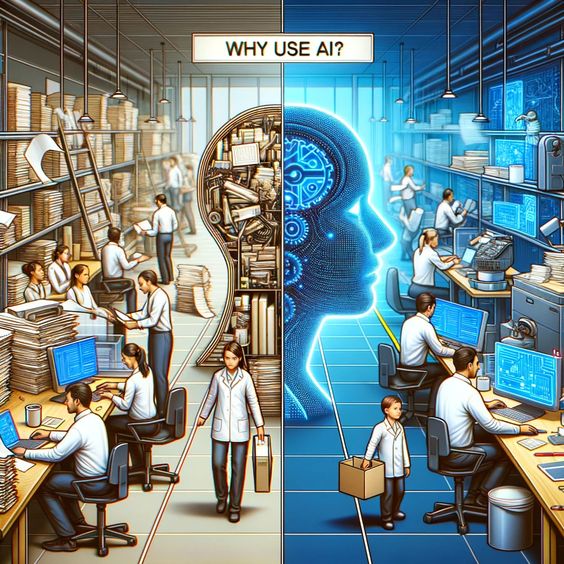By integrating AI into your operations, you can automate tasks, enhance customer interactions, and unlock valuable insights. This comprehensive guide explores the multifaceted role of AI for small businesses, providing actionable insights on implementation, overcoming challenges, and preparing for future advancements.
Understanding AI for Small Businesses
What is AI for Small Businesses?
AI for small businesses encompasses the use of artificial intelligence technologies to improve various aspects of business operations. These technologies include:
- Robotic Process Automation (RPA): Automation of routine tasks using software robots.
By integrating these technologies, small businesses can streamline operations, enhance customer service, and make data-driven decisions.
The Importance of AI for Small Businesses
AI for small businesses offers numerous benefits, including:
- Increased Efficiency: Automate repetitive tasks to save time and reduce errors, allowing your team to focus on strategic activities.
- Enhanced Customer Service: Provide personalized support and instant responses to customer inquiries, improving overall satisfaction.
- Data-Driven Insights: Analyze large volumes of data to uncover trends, predict future outcomes, and make informed business decisions.
Embracing AI can help small businesses compete effectively, adapt to market changes, and drive growth.
Key Applications of AI for Small Businesses

Automating Routine Tasks
AI for small businesses excels in automating routine tasks, freeing up valuable time and resources.
Examples of Automation
- Chatbots: AI-powered chatbots handle customer inquiries, process orders, and provide support around the clock. They can be programmed to answer frequently asked questions, guide users through complex processes, and escalate issues to human agents when necessary. Learn more about chatbots
- Email Marketing: AI tools can automate email marketing campaigns, segment audiences, and personalize messages based on user behavior and preferences. This ensures that your marketing efforts are more targeted and effective. Explore AI in email marketing
Enhancing Customer Experience
AI for small businesses significantly enhances customer experience by offering personalized interactions and efficient service.
Personalized Marketing Strategies
- Customer Segmentation: AI analyzes customer data to create detailed segments based on demographics, behavior, and purchase history. This allows for more targeted marketing efforts and improved engagement. Discover AI in customer segmentation
- Recommendation Engines: AI-driven recommendation engines suggest products or services that align with individual customer preferences and previous purchases. This increases the likelihood of cross-selling and upselling. Learn about AI recommendation systems
Real-Time Customer Support
AI enables real-time customer support through chatbots and virtual assistants. These tools can handle a wide range of inquiries, from simple questions to complex troubleshooting, providing instant responses and improving customer satisfaction. Explore AI in customer support
Leveraging Data Analytics
AI-powered data analytics offer valuable insights that drive business strategy and decision-making.
Benefits of AI-Driven Analytics
- Trend Analysis: AI identifies emerging market trends and shifts in consumer behavior, allowing businesses to adapt their strategies proactively. Read about trend analysis with AI
- Customer Insights: AI provides a deeper understanding of customer preferences and behaviors, enabling businesses to tailor their products and services to meet customer needs more effectively. Explore AI in customer insights
Enhancing Operational Efficiency
AI for small businesses can optimize various operational aspects, from supply chain management to employee scheduling. AI-driven systems analyze operational data to identify inefficiencies and recommend improvements.
AI-Driven Operational Improvements
- Supply Chain Optimization: AI predicts demand, manages inventory, and streamlines supply chain logistics. Read about AI in supply chain management
- Employee Scheduling: AI tools create optimized employee schedules based on historical data, employee availability, and business needs. Learn about AI in employee scheduling
Implementing AI in Your Small Business

Step 1: Identify Business Needs
Before implementing AI for small businesses, assess your specific needs and pain points. Determine which areas of your business could benefit from AI technologies, such as automating routine tasks, enhancing customer service, or analyzing data.
Step 2: Select Appropriate AI Tools
Research various AI solutions to find the best fit for your needs.
Popular AI Tools for Small Businesses
- CRM Systems: AI-enhanced CRM platforms like Salesforce and HubSpot manage customer relationships, track interactions, and provide insights. Explore CRM systems
- Chatbots: Tools such as Drift and Intercom offer AI-driven customer support, handling inquiries and providing instant assistance. Learn about Drift and Intercom
- Analytics Platforms: AI-powered analytics platforms like Google Analytics and Tableau offer in-depth reporting and data visualization. Discover Google Analytics and Tableau
Step 3: Train Your Team
Ensure that your team is equipped to use AI tools effectively. Provide training and support to help employees understand and utilize new technologies. Offer resources and workshops to facilitate a smooth transition.
Step 4: Monitor and Optimize
Regularly monitor the performance of your AI systems to ensure they are delivering the desired results. Analyze their impact on your business operations and make necessary adjustments to optimize performance.
Challenges and Solutions in AI for Small Businesses

Data Privacy and Security
Challenge: Protecting customer data and ensuring privacy when using AI tools.
Solution: Implement robust data protection measures, including encryption and secure access controls. Read about GDPR compliance
High Initial Costs
Challenge: The initial investment in AI technology can be significant for small businesses.
Solution: Start with cost-effective AI solutions and scale up as your business grows. Many AI tools offer flexible pricing models and subscription plans. Explore affordable AI tools
Integration with Existing Systems
Challenge: Integrating AI with current business systems can be complex and time-consuming.
Solution: Choose AI solutions that offer seamless integration with your existing systems. Work with technology partners who can assist with the integration process. Read about integrating AI systems
Managing Change
Challenge: Adapting to new AI technologies can be challenging for staff and may require changes in workflow.
Solution: Communicate the benefits of AI clearly to your team and provide comprehensive training. Involve employees in the implementation process to foster acceptance and ease the transition. Learn about change management with AI
Future Trends in AI for Small Businesses

Advanced AI Analytics
The future of AI for small businesses will involve more advanced analytics capabilities. AI will provide deeper insights and predictive analytics, helping businesses make more informed strategic decisions.
Emerging Trends
- Predictive Analytics: AI will increasingly focus on forecasting future trends and outcomes based on historical data. Read about predictive analytics
- Real-Time Data Processing: AI will enable real-time data processing, allowing businesses to react quickly to market changes. Explore real-time data processing
AI-Powered Customer Service
AI will continue to evolve in customer service, with more sophisticated chatbots and virtual assistants offering highly personalized support and managing complex queries.
Future Developments
- Conversational AI: Advances in NLP will lead to more natural and human-like interactions between customers and AI systems. Learn about conversational AI
- Omnichannel Support: AI will provide seamless support across various channels, including social media, email, and messaging apps. Read about omnichannel support
Increased Automation and Efficiency
Future AI advancements will drive further automation of complex tasks, enhancing operational efficiency and productivity. AI will play a crucial role in optimizing various business functions.
Key Areas of Automation
- Robotic Process Automation (RPA): AI-powered RPA will automate complex workflows and business processes. Explore RPA
- AI in HR and Recruitment: AI will streamline HR processes, including recruitment, onboarding, and performance management. Read about AI in HR
FAQs About AI for Small Businesses

What is AI, and how does it benefit small businesses?
AI, or Artificial Intelligence, involves the use of technology to perform tasks that typically require human intelligence. For small businesses, AI can automate routine tasks, enhance customer service, and provide valuable data insights. These benefits lead to increased efficiency, improved customer satisfaction, and better decision-making.
How can AI improve customer service for small businesses?
AI improves customer service by providing 24/7 support through chatbots, offering personalized interactions based on customer data, and automating responses to frequently asked questions. This results in faster resolution of issues, enhanced customer satisfaction, and more efficient service delivery.
What are the costs associated with implementing AI in small businesses?
The cost of implementing AI varies depending on the tools and platforms you choose. Initial investments can be significant, but many AI solutions offer scalable pricing models and subscription plans that can accommodate different budgets. Starting with affordable solutions and scaling up as needed can help manage costs. Explore pricing models for AI tools
How do I choose the right AI tools for my small business?
To choose the right AI tools, assess your business needs and objectives. Look for solutions that align with your goals, offer ease of use, and provide good customer support. Consider factors such as integration capabilities, scalability, and cost. Research and compare different tools to find the best fit for your needs. Read about choosing AI tools
What are the common challenges of using AI in small businesses?
Common challenges include data privacy concerns, high initial costs, integration issues, and managing change. Address these challenges by implementing strong data protection measures, starting with cost-effective solutions, choosing tools that integrate easily with existing systems, and providing comprehensive training to your team. Learn about overcoming AI challenges
Conclusion
AI for small businesses is a powerful tool that can drive efficiency, enhance customer experience, and provide valuable insights. By understanding its applications, addressing challenges, and preparing for future trends, small businesses can harness the full potential of AI. Embrace AI today to unlock new opportunities for growth and innovation in the modern marketplace.
Integrate AI into your business operations to stay competitive and achieve sustainable success in an ever-evolving market.





[…] FOR NEXT POST CLICK HERE […]